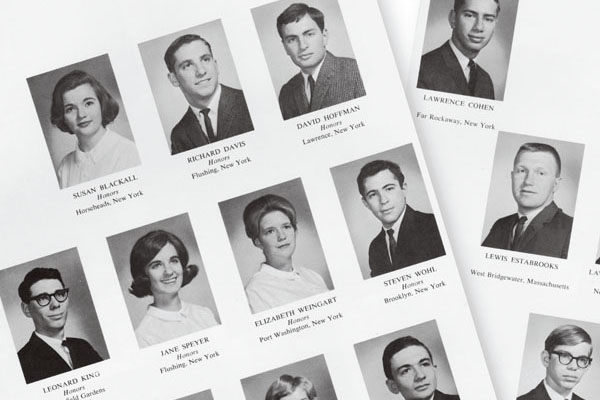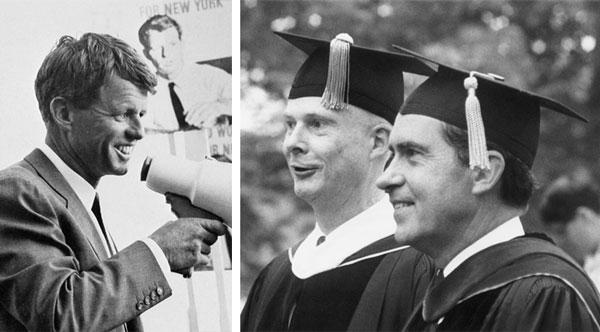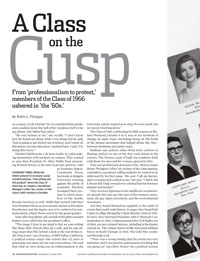Features
 CHANGING TIMES: While the 1960s ushered in dramatic social transformations, “everything still felt gradual” when the Class of 1966 was on campus, says Betsey Weingart Cullen ’66, cochair of the class’s 50th reunion in October. (Photo: University Libraries/Department of Rare Books, Special Collections, and Preservation)
CHANGING TIMES: While the 1960s ushered in dramatic social transformations, “everything still felt gradual” when the Class of 1966 was on campus, says Betsey Weingart Cullen ’66, cochair of the class’s 50th reunion in October. (Photo: University Libraries/Department of Rare Books, Special Collections, and Preservation)As a senior, Cecily Drucker ’66, two months before graduation, padded down the hall of her residence hall to the pay phone. Her father had called.
“He was furious at me,” she recalls. “I don’t know how he found out about what I was doing, but he said, ‘You’re going to get kicked out of school, and I spent all this money on your education.’ I pushed back. I said, ‘I’m doing this. Sorry.’ ”
Drucker had become a de facto leader in a plan gaining momentum with students on campus. They wanted to stop then President W. Allen Wallis from presenting Richard Nixon, at the time in private practice, with an honorary degree. Comments Nixon had made at Rutgers University warning against the perils of academic freedom prompted their protest, in which members of the faculty became involved, as well. Wallis had worked with then Vice President Nixon as an economic advisor to President Eisenhower, and the degree was to be conferred at commencement, where Nixon was to be the guest speaker.
Soon after that phone call, several of the plan’s student leaders were called into the president’s office.
“The image I have in my mind is that we were sitting like these little church mice on a sofa, and he was sitting, larger than life, behind a desk at the end of this really long room,” says Drucker, of Mill Valley, California, a political science major who retired after 42 years of practicing real estate tax law and transactions. “He said that what we were doing was an embarrassment to the University and he wanted us to stop. We were meek, but we weren’t backing down.”
The Class of 1966, celebrating its 50th reunion at Meliora Weekend, October 6 to 9, was on the forefront of change in many ways—including being on the brink of the protest movement that helped define the ’60s— between freshman and senior years.
Students saw policies relax—from strict curfews to floating curfews to one of the first coed dorms in the country. The Towers, a pair of high-rise residence halls with floors for men and for women, opened in 1963.
They saw professional dynamics relax. History major Betsey Weingart Cullen ’66, cochair of the class reunion, remembers a professor telling students he wanted to be addressed by his first name. “He said, ‘Call me Bernie,’ and it was just such a shock to me,” she says. “I did it, but I always felt I had crossed over a formal barrier between student and teacher.”
They received diplomas in the middle of a revolutionary decade that also saw the start of the women’s movement, the gay rights movement, and the environmental movement.
And they found themselves regularly in the midst of events that would make history. In anger, they hung Fidel Castro in effigy during the Cuban Missile Crisis in 1962. In tears, they mourned President John F. Kennedy’s assassination in 1963. Congress passed the Civil Rights Act of 1964, yet race-related violence, including in Rochester, carried on. The United States swiftly increased military forces in South Vietnam in 1965. The Cold War continued through it all.
“There was a strong feeling that the world was very turbulent, and it was hard to understand everything that was going on,” says Marc Holzer ’66, a political science major who served as both student body president and class president. He remembers successfully advocating for funding, as chair of the finance board, to support Student Peace Union members traveling south for civil rights demonstrations, despite opposition from more conservative members.
Now living in Cambridge, Massachusetts, Holzer is founding dean emeritus of the School of Public Affairs Administration and holds the title of University Professor at Rutgers. “To some extent, my class was a transition point from professionalism to protest,” he says. “There was more of a political awakening by the time we left campus.”
The class had started its Rochester years in a quieter fashion. Days after arriving as freshmen, the men and women of the class left for Frosh Camp, where they sang, hiked, played games, and met new classmates, in some cases establishing lifelong friendships. Cullen reminisces about being in the outdoors at Frosh Camp, charged with writing a class song and cheer—and learning the schoolwide clap—before reciting the cheer from memory:
We’re the class forever strong,
Can’t be beat—
Can’t go wrong,
We’re the class with all the zest,
We can take it—
We’re the best,
We are smart—
Know all the tricks
U of R, U of R—’66
“It speaks of common identity,” she says. “Shared activities build loyalty and a greater sense of community.”
And they learned “The Genesee,” Rochester’s alma mater, set to music by Herve Dwight Wilkins, from the Class of 1866 and great-grandfather of Jocelyn Trueblood ’66 (see sidebar). But while such songs lend continuity to the Rochester experience over generations, music also reflected the changing times.
For Richard (Richie) Woodrow ’66, the musical theater shows that he composed while on campus in the 1960s inadvertently reflected a cultural awakening. The former English major interrupts himself to analyze the evolution of his theatrical work during his years at the University, acknowledging that he had never before noticed the subject matter moving over time toward more pressing concerns.
“They were all in the format of the old American musical, quite formulaic and upbeat and fun, and yet they started to get more serious,” he says. “They were becoming more centered on politics, ideology, breaking boundaries, and a changing world. I think what we were striving for was this notion that things aren’t quite what they seem. We recognized that everything wasn’t all fluff.”
 CAMPUS POLITICS: New York Senate candidate Robert Kennedy (left) visited campus in 1964, while former Vice President Richard Nixon delivered the class’s commencement address in 1966. (Photo: University Libraries/Department of Rare Books, Special Collections, and Preservation)
CAMPUS POLITICS: New York Senate candidate Robert Kennedy (left) visited campus in 1964, while former Vice President Richard Nixon delivered the class’s commencement address in 1966. (Photo: University Libraries/Department of Rare Books, Special Collections, and Preservation)During their years on campus, the antiwar movement began to stir. In the spring of 1966, the newly formed Student Peace Union organized a “Vigil for Peace in Vietnam,” held from noon to midnight on the Eastman Quadrangle, timed to coincide with Parents’ Weekend and the ROTC Sunset Parade. According to the first issue of the group’s newsletter that April, the vigil was quiet, though not without opposition. They were counterpicketed twice, and endured some hurled iceballs and eggs. Eighteen months later, protesters had propelled the University into national headlines as they staged a sit-in against Dow Chemical, maker of napalm, recruiting on campus.
Cullen laughs as she recounts her first foray into protesting.
“We led a campaign to preserve the tradition of the freshman beanies,” she says, referring to the blue and yellow hats that had the wearer’s graduation year embroidered on the front. “They were going to eliminate them our sophomore year, so we started a letter-writing campaign, but we were on a sinking ship by that point. We lost.”
Camp Sites
1924: The first Frosh Camp is held at the YMCA’s Camp Cory on Keuka Lake. Twenty-nine freshman men, 11 upperclassmen, and one faculty member attend. Women students go to a three-day “house party,” hosted by members of the junior class, at Camp Wacona at Sea Breeze amusement park.
1938: Camp activities for men move to the new facilities of the River Campus, with two exceptions: before classes begin in 1961 and 1962, the men return to Camp Cory.
1967: Women attend Frosh Camp for the last time.
2005: The orientation program launches a modern counterpart to Frosh Camp: Freshman Orientation Outing Treks (FOOT). At the start of every year, about 100 freshmen are chosen to take part in the three-day pre-orientation program, hiking, biking, camping, and exploring New York parks.
2016: Orientation for new students in Arts, Sciences & Engineering is a weeklong experience that aims to introduce incoming students to each other, the campus, and the local community, with a parallel two-day program for parents.
—Robin L. Flanigan
Drucker and the other students opposing Nixon’s honorary degree did not. Though Nixon spoke—on academic freedom—at graduation, Wallis’s office circulated a press release beforehand, saying that Nixon’s acceptance of the invitation to speak was not contingent on receiving an honorary degree, and that, in fact, it was his policy not to accept them.
As for Nixon’s speech, “everybody was really respectful of him,” Drucker says.
But most student demonstrators were respectful while still making their case, notes reunion cochair Larry Cohen ’66, who majored in general science and took part “in a fair number of protests.”
“There were hundreds of us,” says Cohen, a Los Angeles resident and a radiology professor at the Keck School of Medicine of the University of Southern California. “We didn’t storm the dean’s office or do anything crazy like that, but there were all kinds of sit-ins where we blocked traffic on River Boulevard—what is now Wilson Boulevard—to protest the Vietnam War. We wanted to be heard and seen and to show that we knew things were going on in the world and we didn’t like it.
“We’d shut down the campus, and if there was traffic, that was just too bad. You had to find another way out of there.”
For all the turmoil of the times, there were a lot of changes to celebrate as well. For Cohen, who married Jane Zimelis Cohen ’67, one of them was the chance to live in the Towers. “You were on somewhat better behavior, and you cleaned up a lot more because you never knew when someone was going to pop into your suite,” he says. “It just changed our whole lifestyle. That’s one of my favorite memories.”
Hundreds of members of the Class of 1966 will exchange memories at their reunion during Meliora Weekend.
“What we’ll do is stop time, turn back the clock for a few days,” says Cullen.
Back to a time when freshmen, still largely anchored in the more staid 1950s, emerged in 1966 as seniors living on the cusp of great social change.
“It was a very challenging time to be alive, especially as we moved farther on into the ’60s,” adds Cullen. “But everything still felt gradual.
“When you’re in college, a year is a long time. When you’re in your 70s, like I am, a year goes very quickly.”

